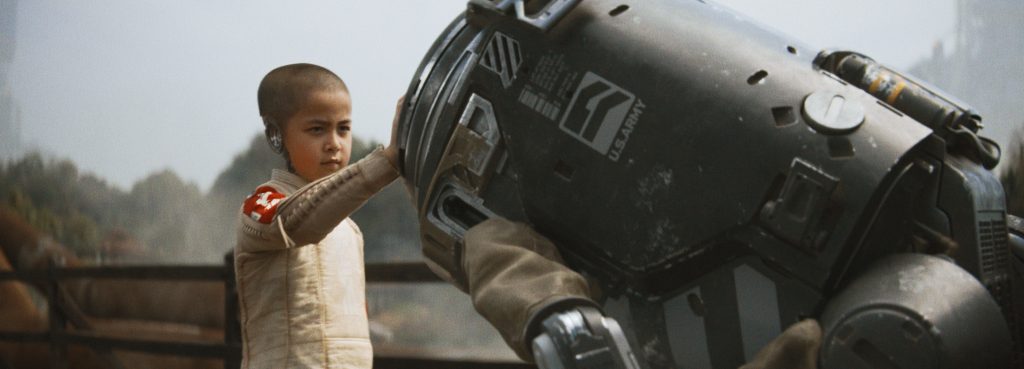Artificial intelligence is relevant now more than ever. With both language and image generative learning models becoming more and more popular, AI is getting eerily close to replicating various human tendencies. Articles are being written and images are being created by bots that are only getting better with time. And yet there is still that human intellect and creativity that cannot be captured by any machine. At least not yet. There is still a vast difference between human and machine, but will we ever reach a point in which AI can truly interact independent of humanity? Gareth Edwards’ The Creator envisions a world where that idea doesn’t seem so far off, although while technology continues to evolve, human emotion and conflict remain stuck in the past. The sci-fi film excels with its visuals and performances, and while the story opens up a world of possibilities, its stiffness in only scratching the surface of humanity and AI feels like a missed opportunity to go deeper with the genre.
In the future, technology and artificial intelligence has grown to the point robots can do many of the same tasks as humans and have become vital across almost all sectors of industry across the globe. But when an atomic bomb is accidentally detonated in the heart of Los Angeles, the United States deems AI to be too dangers and declares war against the machines. They’ve constructed a massive military ship named Nomad that can hunt down and completely obliterate any AI facilities. The majority of robots have relocated to Southeast Asia where the population is more accepting of them. But war continues to loom on the horizon as rumor of an even more advanced AI weapon is being developed; one that has the potential to destroy humanity as we all know it. Special forces agent Joshua (John David Washington) is tasked with infiltrating the compound where this weapon is being developed and destroy it alongside its creator and leader of the AI rebellion, the mysterious Nirmata. When he discovers a young AI child at the center of the complex, however, he begins to question his mission and purpose.
Gareth Edwards has done a fantastic job at creating a futuristic world where artificial intelligence has taken over nearly every corner of society. Joshua himself has benefited from the technology having lost both an arm and a leg in a previous mission and now uses nearly indistinguishable prosthetics. In some places of the world, humans can sell their likenesses and be scanned so that robots can wear their faces. We’re given only glimpses of this larger world through the eyes of Joshua. During his mission he encounters all different walks of life, from people living peacefully with robots to entire robot societies. Some people have even formed relationships with machines. The world of The Creator feels vast and lived in; every character has their own story to tell. And yet while technology overall has expanded, the United States is strictly against any humanoid robotic. Herein lies my biggest issue with the film.

It’s impossible to discern where the line is in regards to AI. The United States is so staunchly opposed to AI and yet we can assume that the majority of the technology we see in the film is powered by AI to some degree. Their weapons, vehicles, and even Nomad itself has one form of AI or another. Rather than offer up any explanation, the film is very black and white in its depiction; humanoid robots are bad. Everything else is fine, though. There is opportunity to explore this on a more in-depth level, but The Creator is a sci-fi action movie first and foremost, not a philosophical drama. It favors gun fights and explosions over the repercussions of a machine having conscious thought. The groundwork is there.
There’s a scene where special forces troops use suicide bomb robots who run to a target’s location and then explode. After they’re activated, they give a final farewell speech, salute, and then run to their inevitable doom. They know this too because one of the robots has somewhat of an existential crisis before being sent off to explode. Why design a bomb such as this when targeted missiles can do the same. Why give it a voice and independent thought? None of it is really explored unfortunately. It simply exists and for the film, that’s enough.
While The Creator puts humans against the machines, what it truly is is a story that is more anti-war than it is anti-AI. As Joshua escorts this young AI child weapon he begins to bond with it, naming her Alpha-Omega or “Alphie” for short. What makes her special is her ability to learn and develop her powers which allow her to shut off any machine in her vicinity at will. There’s nothing new about a machine that learns and grows on its own; we’ve seen that plenty of times in film. The Creator is more about exploring the bond between Joshua and Alphie. And it’s John David Washington and Madeleine Yuna Voyles who really sell this film. Their dynamic as it develops from what is essentially an assassination mission to an escort mission is what keeps you invested in this futuristic world. Human or robot, it’s their emotions that are the heart and soul of The Creator.
I thoroughly enjoyed The Creator and the world that Gareth Edwards has envisioned. The story itself isn’t that special, but the way in which it is told and shown is what drives the film. There’s a lot more that can be explored, and I would love to see more stories told in the same universe. The Creator might not build the biggest or most complex creation, but it lays a solid foundation. One that I am hopeful we will get to see more of in the future.
-
The Creator
Summary
The sci-fi film excels with its visuals and performances, and while the story opens up a world of possibilities, its stiffness in only scratching the surface of humanity and AI feels like a missed opportunity to go deeper with the genre.







